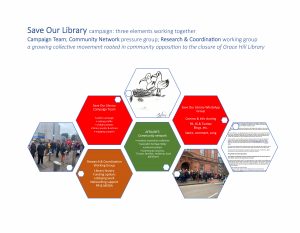
The Save Our Library campaign emerged organically in response to the decision by Kent County Council to close Grace Hill Library – in late 2022.
In many ways, this is a first major initiative for One Folkestone, putting forward a proposal for how local assets should be used for our community.
This page provides information for anyone supporting the Save Our Library campaign – challenging Kent County Council’s decision to close Grace Hill Library and putting forward an alternative vision for this classic public building.
The campaign supporters group involves a wide range of local activists as well as people who have rarely if ever joined a protest. This issue has really struck a chord – with local historians, families, children, those in search of a peaceful warm space to read, browse and enjoy.
We all hope this page will encourage others to join the campaign and do what you can to save a cherished community asset.
CAMPAIGN LATEST!
An imaginative community proposal has been developed in partnership with Creative Folkestone, which shows a way forward to repair the building and reimagine its use as a combined arts, library and community facility. This was presented to Kent County Council in October 2025 and is now under consideration, with support from our local MP, the District and Town councils and many local groups and individuals.
As a creative twist on the campaign, a new project called Folkestone is a Library has secured Arts Council funding …
Latest information for the campaign can be found on the SOL Facebook page:
click here to view
You can contact the campaign team via our email address: just click on the link….
The team have been producing regular newsletters – email if you would like to be added to the circulation listing.
A very readable history of the Grace Hill Library by Professor Carolyn Oulton can be found by clicking here.

This graphic illustrates the three main strands of the campaign:
- Campaign team
- Community network
- Research & Coordination group
Useful links: info and background
- Grace Hill Library building information….
- Building issues were shown in an approved planning application for works submitted in September 2021
- Amey produced a historic buildings statement and assessment of work required – it showed the solutions.
- A schedule of works was included in the application, showing preparation for tendering
- Kent County Council position
- The Council published an initial statement on 27th March and further updates on their webiste, which you can se here
- Alternative interim library services are listed here
- Snippets: History of the Library (researched by Professor Carolyn Oulton)
- Community reaction
- www.afra.network is a local residents’ group platform – together with New Folkestone Society they have brought together over 30 local community and civic voice groups with a common love of heritage, history, research and culture.
- A group meeting was held on March 28th: the meeting notes are available here
- The community group statement and letter can be read here – we will publish a reply when we get one!
- Political position
- Damian Collins MP has published a personal statement on the future of the Library which you can read here
- General background on Library provision at threat
- An overview of Library cuts in the last decade was published in The Tribune in January 2021 – link here
- The Librarianship Studies group have voiced concerns at loss of Libraries and collated some great quotes
